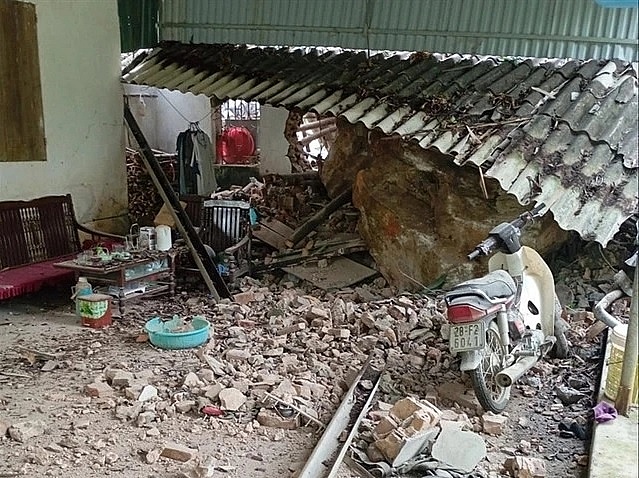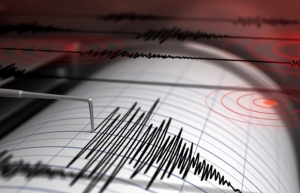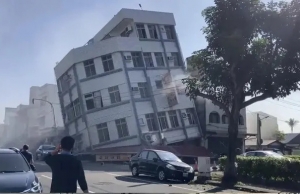High-risk earthquake areas need response plans
 |
| Rocks from the mountain rolled down onto a house in Cao Duong Commune, Luong Son District in Hoa Binh province following an earthquake on March 25 in Mỹ Đức District. (Photo: tuoitre.vn) |
Hanoi - In recent years, earthquakes have occurred more frequently in Vietnam and appear to be on the rise. Therefore, communities in high-risk earthquake areas need to understand this type of natural disaster and develop proactive response plans, an expert has said.
Since the beginning of 2024, Vietnam has experienced 135 earthquakes in many localities. All were minor earthquakes with magnitudes ranging from 2.5 to 4.1.
Notably, in Kon Plong district in the Central Highlands province of Kon Tum, earthquakes occur almost daily, with sometimes seven or eight tremors happening in a single day.
Earthquakes have also been recorded in other areas across the country, including regions where they were previously rare, such as My Duc district in Hanoi, and northern Ninh Binh and Yen Bai provinces.
Nguyen Xuan Anh, Director of the Institute of Geophysics at the Vietnam Academy of Science and Technology, stated that most of the earthquakes in 2024 have been induced by human activities, particularly hydro-electric power operations.
A small number of earthquakes were tectonic, occurring along natural fault zones.
Data from the Institute of Geophysics showed a significant increase in earthquake occurrences over the past five years. Specifically, there were 52 earthquakes in 2019, 98 in 2020, 183 in 2021, 293 in 2022, and 353 in 2023.
Particularly, from 2021 to 2023, the number of earthquakes increased three to six or seven times compared to 2019. This rise is mainly due to the increased number of induced earthquakes caused by hydro-electric reservoir operations.
Recent data also showed that the northwest region experiences the strongest earthquakes in the country due to several natural fault zones.
According to the earthquake hazard zoning map from the Institute of Geophysics, Vietnam is not near these boundaries but is located on the Eurasian Plate, making its geology more stable. Earthquakes in Vietnam are typically of moderate magnitude and less destructive compared to those near plate boundaries.
The strongest possible earthquakes in Vietnam could reach a magnitude of 7.5, with a historical record of a 6.8 magnitude earthquake. These primarily occur in the northwest region and the north central province of Nghe An.
In other areas such as Kon Tum and major cities like Hanoi, Da Nang, and Ho Chi Minh City, potential earthquakes would likely range from 5.0 to 5.9. Elsewhere in the country, earthquakes are generally mild, below 5.0 in magnitude.
Most earthquakes in Vietnam range from 5.0 to 5.9 in magnitude, causing minor structural damage like shaking houses and slight cracks in walls.
Recently, some earthquakes have occurred in areas with traditionally low seismic activity. For example, a 4.0 magnitude earthquake on 25 March in My Duc district caused tremors in nearby areas including Ung Hoa and Chuong My in Hanoi, Kim Boi, Luong Son, and Lac Thuy in Hoa Binh province, and Kim Bng in Ha Nam province.
This rare event occurred in the Red River - Lo River - Chay River fault zone. When these faults accumulate enough energy, they generate earthquakes.
On 27 May, a 3.4 magnitude earthquake in Nho Quan district in Ninh Binh province caused tremors in Thach Thanh district in Thanh Hoa province. This earthquake was due to the area being in the Da River fault zone.
Regarding earthquake reporting and forecasting, Director of the Institute of Geophysics Anh stated that in the first half of 2024, most earthquakes across the country had magnitudes between 2.5 and 4.1, posing little natural disaster risk.
However, he said, earthquakes are notoriously difficult to predict, especially the precise timing of their occurrence. Therefore, understanding earthquakes and how to prepare for them is crucial, particularly in high-risk areas.
Anh said the Institute maintains a national earthquake monitoring system with nearly 40 stations nationwide. In addition, local stations monitor induced seismic activity from hydro-electric reservoirs in the northwest and the central province of Quang Nam.
Recently, the institute established eight local monitoring stations in Kon Tum Province. These stations provide rapid, accurate earthquake data, essential for assessing seismic activity, dam safety and reservoir operations.
He said local authorities should develop annual earthquake response plans based on such activity and in at risk areas, it is important to increase public awareness and earthquake preparedness training.
Basic knowledge about earthquakes and how to respond is essential, he said.
During an earthquake, residents indoors should take cover under a table to protect themselves from falling objects and wait until the shaking stops, avoid using elevators due to potential power outages and turn off circuit breakers before evacuating to prevent fires from forgotten electrical appliances.
 | Earthquake shakes western Indonesia Indonesia’ meteorology, climatology and geophysics agency announced that a 5.7 magnitude earthquake hit off the country's western province of Banten in on January 3 morning, yet did not trigger a tsunami. |
 | Embassy sends delegation to assist Vietnamese in quake-hit Ishikawa prefecture The Vietnamese Embassy in Japan on January 4 sent a working delegation, led by Minister Nguyen Duc Minh, to Ishikawa prefecture, which was hardest hit by the earthquake that occurred on January 1 to assess the situation and provide assistance for Vietnamese citizens facing difficulties there. |
 | No Vietnamese casualties reported in Taiwan earthquakes: office There has not been any information on casualties related to Vietnamese people in strong earthquakes and aftershocks that hit Taiwan (China) on April 3, according to the Vietnam Economic and Cultural Office in Taipei. |
What the stars mean:
★ Poor ★ ★ Promising ★★★ Good ★★★★ Very good ★★★★★ Exceptional
Related Contents
Latest News
More News
- Congratulations from VFF Central Committee's int’l partners to 14th National Party Congress (January 25, 2026 | 09:46)
- List of newly-elected members of 14th Political Bureau announced (January 23, 2026 | 16:27)
- 14th Party Central Committee unanimously elects To Lam as General Secretary (January 23, 2026 | 16:22)
- List of members of 14th Party Central Committee announced (January 23, 2026 | 09:12)
- Highlights of fourth working day of 14th National Party Congress (January 23, 2026 | 09:06)
- Press provides timely, accurate coverage of 14th National Party Congress (January 22, 2026 | 09:49)
- Press release on second working day of 14th National Party Congress (January 22, 2026 | 09:19)
- Minister sets out key directions to promote intrinsic strength of Vietnamese culture (January 22, 2026 | 09:16)
- 14th National Party Congress: Renewed momentum for OVs to contribute to homeland (January 21, 2026 | 09:49)
- Party Congress building momentum for a new era of national growth (January 20, 2026 | 15:00)

 Tag:
Tag:

















 Mobile Version
Mobile Version